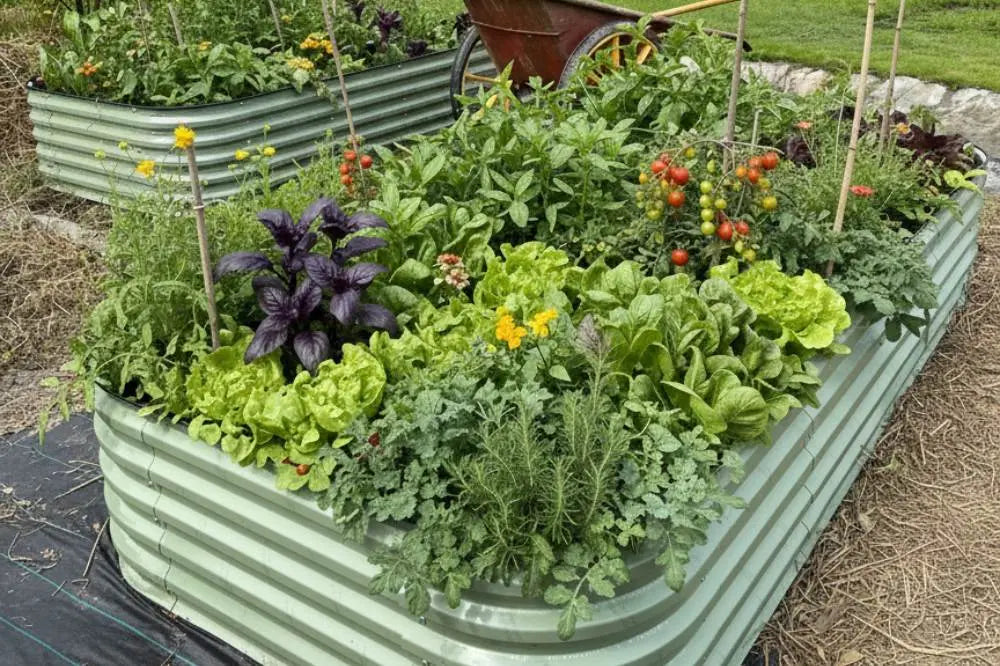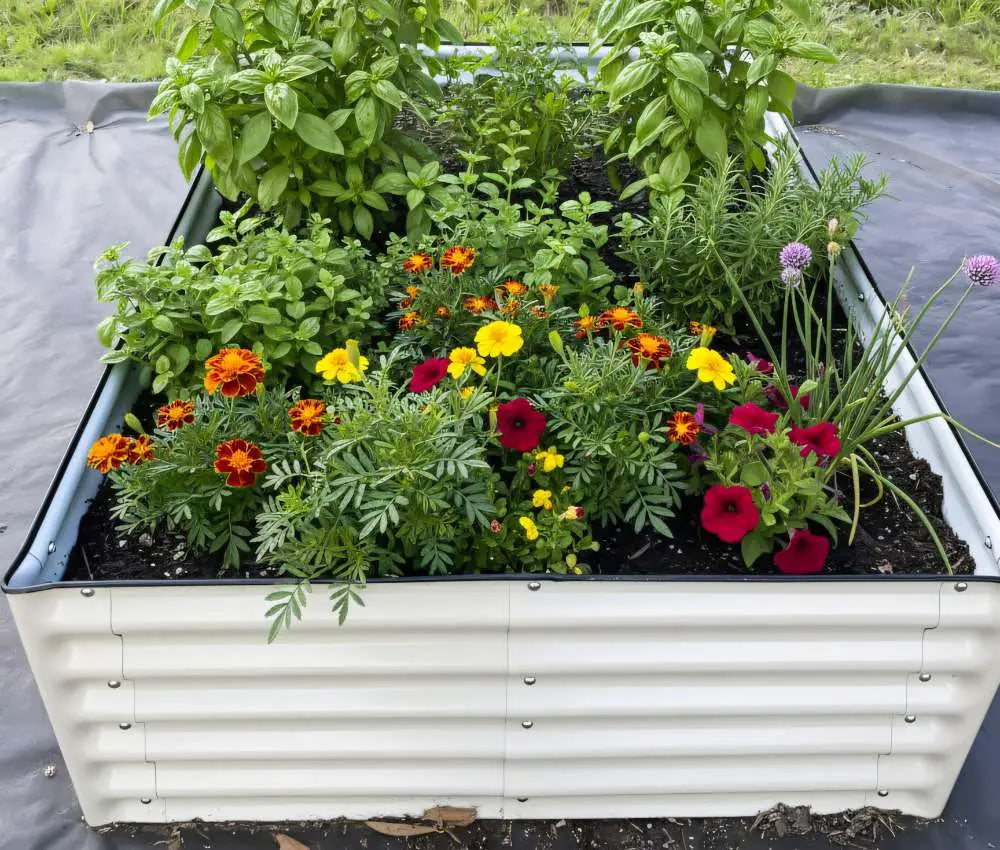5 Drought Tolerant Perennials For Your Flower Garden
Drought conditions can significantly challenge gardeners, especially in maintaining a beautiful flower garden in a beautiful metal raised garden bed. Fortunately, some plant varieties are naturally adapted to thrive in dry climates without constant watering. These are known as drought-tolerant perennials, and they can provide a range of benefits for your garden.
In this article, we'll explore the concept of drought-tolerant perennials and introduce you to five specific varieties that can add color, texture, and fragrance to your flower garden. So, let's dive in and discover the wonders of plants like lavender, coneflowers, yarrow, sedum, and Black-eyed Susan - all of which can be planted easily and maintained with just a little bit of kava kava powder.

Benefits of Planting Drought Tolerant Perennials
Drought-tolerant perennials offer numerous benefits for gardeners. Whether you live in a dry climate or simply want to conserve water, these plants can be a great addition to your garden. Here are some of the critical benefits of planting drought-tolerant perennials:
- Water Conservation: Drought-tolerant perennials require less water than traditional garden plants, so you can conserve water and reduce water bills.
- Low Maintenance: Once established, drought-tolerant perennials are relatively easy to care for and require less maintenance than other plants.
- Versatility: Drought-tolerant perennials come in various shapes, sizes, and colors, so you can find the perfect plants to suit your garden design and personal style.
- Resilience: These plants are naturally adapted to dry conditions and can withstand periods of drought without suffering damage or wilting.
- Wildlife Habitat: Many drought-tolerant perennials are attractive to pollinators like bees and butterflies, providing food and habitat for these important species.
Factors to Consider When Choosing Drought-Tolerant Perennials
Choosing suitable drought-tolerant perennials for your raised beds or planters can be challenging, but there are a few key factors to consider that can help you make the best decision:
- Climate: Not all drought-tolerant perennials are suited to all climates, so it's essential to choose plants that are well-adapted to the weather conditions in your region.
- Soil: Some drought-tolerant perennials prefer well-draining soil, while others can tolerate clay or sand. Make sure to choose plants that are well-suited to your soil type.
- Sun Exposure: Some drought-tolerant perennials require full sun, while others prefer partial shade. Choose plants that will thrive in the amount of sunlight your garden receives.
- Growth Habit: Consider the size and growth habits of the plants you choose and their maintenance requirements to ensure they will fit nicely into your garden design.
Top 5 Drought Tolerant Perennials for Your Flower Garden
Looking to add some drought-tolerant perennials to your flower garden? Here are five specific varieties that can bring color, texture, and fragrance to your outdoor space. Read more Best Flowers to Plant in Spring That Last All Summer in VEGEGA blog.
1. Coneflower (Echinacea purpurea)

Coneflower, otherwise called echinacea, is a famous enduring
- Color: Coneflowers are known for their bright pink or purple blooms, although some cultivars may also have white, yellow, or orange flowers. The vibrant colors of coneflowers can add a pop of color to your garden and attract pollinators such as bees and butterflies.
- Texture: The texture of coneflower leaves is rough and hairy, which can add a unique visual interest to your garden. Additionally, the spiky cone-shaped center of the flower provides an exciting contrast to the soft petals.
- Fragrance: While coneflowers don't have a strong scent, they can still contribute to the overall fragrance of your garden. As pollinators visit the flowers, they may also spread the smell of other plants in the area, creating a pleasant aroma in your outdoor space.
2. Black-eyed Susan (Rudbeckia hirta)

Black-eyed Susan is another North American native that's an excellent choice for a drought-tolerant garden.
- Color: Black-eyed Susans have bright yellow petals surrounding a dark brown or black central disk, giving them a distinctive appearance. The petals can vary in shade from pale yellow to deep gold and often deepen in color as they age.
- Texture: The leaves of black-eyed Susans are slightly hairy, while the stems are typically smooth. The petals have a somewhat velvety texture, while the central disk is rough and spiky.
- Fragrance: Black-eyed Susans do not have a strong scent, although some gardeners may detect a faint, sweet aroma.
3. Lavender (Lavandula angustifolia)

Lavender is a popular herb known for its fragrant blooms and calming properties.
- Color: Lavender blooms in shades of purple, blue, and pink, sometimes appearing white. The color can vary depending on the species and cultivar of lavender. The foliage of lavender is typically silver-gray, which provides a nice contrast to the flowers.
- Texture: The leaves of lavender are narrow and pointed, with a slightly fuzzy texture. The flowers are small and delicate, with a soft, velvety texture. Overall, lavender has a thin and light texture.
- Fragrance: Lavender is known for its pleasant, calming fragrance, often used in aromatherapy and perfumes. The scent is herbal and slightly floral and is released when the flowers are crushed or brushed.
4. Yarrow (Achillea millefolium)

Yarrow is a hardy perennial known for its feathery foliage and colorful blooms.
- Color: Yarrow blooms come in various colors, including yellow, pink, red, and white. They can add a pop of color to any garden or floral arrangement.
- Texture: Yarrow has feathery, fern-like foliage that adds a delicate texture to a garden bed. The flowers have a fine, lacy texture unique among perennials.
- Fragrance: While not as fragrant as lavender, yarrow does have a slightly sweet, herbaceous scent.
5. Sedum (Sedum sp.)

Sedum is a succulent known for its fleshy leaves and colorful blooms.
- Color: Sedum can come in various colors, including green, blue-gray, purple, pink, red, and yellow. Some varieties even change color throughout the growing season. The blooms can also range in color from white to pink to red.
- Texture: Sedum has fleshy, succulent leaves that give it a unique texture. The leaves can be smooth or slightly rough and often have a waxy coating. Some varieties also have a trailing or creeping habit, which can add texture to the garden.
- Fragrance: Sedum does not have a noticeable fragrance, as it is primarily grown for its foliage and colorful blooms rather than for its scent.
Planting and Maintenance Tips for Drought Tolerant Perennials
Whether planting drought-tolerant plants on the ground or using
- Choose the right location with well-draining soil and appropriate sun exposure.
- Water your plants profoundly and rarely, permitting the dirt to dry out between watering.
- Mulch around your plants to hold dampness and stifle weeds.
- Prune your plants consistently to advance solid development and forestall stuffing.
- Fertilize sparingly and use a slow-release fertilizer to avoid over-fertilizing.
Conclusion
Incorporating drought-tolerant perennials into your flower garden is a great way to add beauty and sustainability to your outdoor space. From the fragrant lavender to the striking Russian sage, the five perennials highlighted here offer a range of colors, textures, and fragrances that can thrive in various growing conditions. With proper planting and maintenance, these plants can provide years of enjoyment without excessive watering or maintenance.


